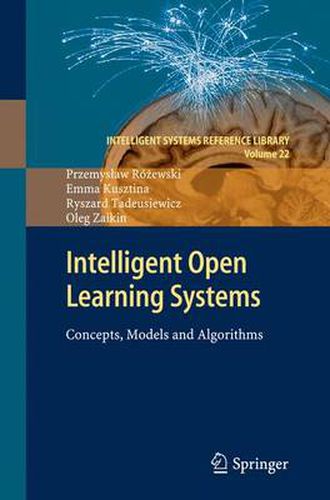Readings Newsletter
Become a Readings Member to make your shopping experience even easier.
Sign in or sign up for free!
You’re not far away from qualifying for FREE standard shipping within Australia
You’ve qualified for FREE standard shipping within Australia
The cart is loading…






This title is printed to order. This book may have been self-published. If so, we cannot guarantee the quality of the content. In the main most books will have gone through the editing process however some may not. We therefore suggest that you be aware of this before ordering this book. If in doubt check either the author or publisher’s details as we are unable to accept any returns unless they are faulty. Please contact us if you have any questions.
In presented book the Intelligent Open Learning Systems (IOLS) are proposed, described, discussed, and evaluated. The IOLS is a system in which traditional methods of online teaching are enhanced through the use of artificial intelligence and cognitive science. This is the main topic of the book.
It consists of ten chapters and is divided into three parts. The first part concentrates on the Open Learning System (OLS) analysis, in particular: the social and educational meanings of the OLS, the new role of the teacher and the new requirements regarding the structure of didactic material. Moreover, the cybernetic model of student, teacher and computer collaboration is presented, the teaching-learning process content and its main characteristics are discussed, and the system based approach to the OLS design is proposed. The second part is focused on the problem of knowledge modeling in the OLS based on the ontology and the competence approaches and leading to the learning object concept and competence management in open systems. The third part describes applications of the OLS in the virtual laboratory for competence transfer, the community-built system of distance learning network, and the AGH student city - the real-life application of the OLS concept.
The authors’ research findings presented in the book should be useful in various applications related to knowledge management, e-learning systems and information systems.
$9.00 standard shipping within Australia
FREE standard shipping within Australia for orders over $100.00
Express & International shipping calculated at checkout
This title is printed to order. This book may have been self-published. If so, we cannot guarantee the quality of the content. In the main most books will have gone through the editing process however some may not. We therefore suggest that you be aware of this before ordering this book. If in doubt check either the author or publisher’s details as we are unable to accept any returns unless they are faulty. Please contact us if you have any questions.
In presented book the Intelligent Open Learning Systems (IOLS) are proposed, described, discussed, and evaluated. The IOLS is a system in which traditional methods of online teaching are enhanced through the use of artificial intelligence and cognitive science. This is the main topic of the book.
It consists of ten chapters and is divided into three parts. The first part concentrates on the Open Learning System (OLS) analysis, in particular: the social and educational meanings of the OLS, the new role of the teacher and the new requirements regarding the structure of didactic material. Moreover, the cybernetic model of student, teacher and computer collaboration is presented, the teaching-learning process content and its main characteristics are discussed, and the system based approach to the OLS design is proposed. The second part is focused on the problem of knowledge modeling in the OLS based on the ontology and the competence approaches and leading to the learning object concept and competence management in open systems. The third part describes applications of the OLS in the virtual laboratory for competence transfer, the community-built system of distance learning network, and the AGH student city - the real-life application of the OLS concept.
The authors’ research findings presented in the book should be useful in various applications related to knowledge management, e-learning systems and information systems.